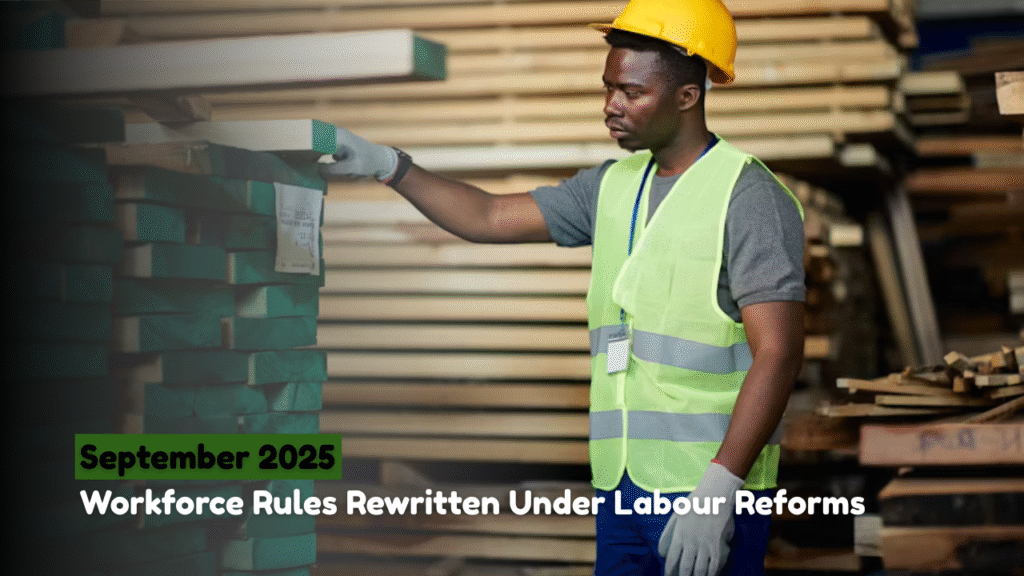Labour Law Reforms Enforced from September 2025 – New Labor Laws in South Africa 2025 South Africa is making major updates to its work laws in 2025. These changes will help protect workers and make jobs safer and fairer. The new rules focus on employee rights and better working conditions. All business owners need to learn these rules to avoid getting fined. The changes will affect how companies hire staff and run their daily operations. Employers should start preparing now to follow these new laws. The government (Labour Relations Act – LRA) wants to make sure all workplaces treat their employees well. These updates will create better standards for both workers and businesses. Companies that don’t follow the new rules might face serious problems. It’s important for every business to understand and use these new laws when they start in 2025.

What Workers and Employers Must Expect
Employers must now give all workers a detailed job contract. This includes people who work part-time and temporary jobs. The new rule stops companies from avoiding their duties to workers. Every contract needs to list work hours, extra hours vacation time and steps for ending the job. This makes things clearer for everyone and protects workers better than before. The update helps make sure companies follow the law and treat their staff fairly.
Following these rules helps create better relationships between workers and bosses. It cuts down on fights at work and makes everything clearer for both sides. If companies don’t follow these rules they can get in trouble with the government (local or national level agency). The Department of Employment and Labour (DEL) might give them fines or take them to court.
Tighter Controls on Overtime and Shifts
We want to protect our employees from working too much. Everyone should stick to the normal 45-hour work week. We will watch and track overtime hours more carefully now. Employees need to give written permission before working any extra hours. All overtime pay must be given on time to avoid any problems about money. These rules help keep things fair and clear for everyone.
The government will create special safety rules for mining transport and healthcare workers who work long hours. These rules will help protect workers in these dangerous jobs. Each industry will get its own set of safety guidelines to follow.

Stronger Wage Fairness and Anti-Discrimination Rules
Companies must now follow stricter rules about equal pay at work. Every year they need to check if all workers get the same money for doing the same job. It doesn’t matter if employees are men or women what race they are, or if they work full-time or part-time. These checks help stop unfair pay differences between workers who do similar tasks. Bosses must look at their payment records & fix any gaps they find. This makes workplaces more fair for everyone.
The minimum wage will go up in 2025. This new rule affects all types of workers including full-time part-time and temporary staff. Every employer must pay their workers at least this new minimum amount. Companies that don’t follow this rule could face fines. They might also see their names published for breaking the law. The change makes sure workers get fair pay no matter what job they do. Businesses need to prepare for this update and make sure they pay the right amount.
New Standards for Health, Wellness, and Worker Protection
Companies must keep their workers safe according to new rules. Workers can now get help with stress & burnout through mental health support at work. This is important because more people are struggling with these issues in South Africa since COVID-19 ended.
Why Employers Must Act Without Delay
The new labor laws will start in 2025 but companies should begin making changes now. Business owners who don’t follow these rules risk getting fines and dealing with worker problems. They might also get bad press. These updates show that South Africa wants better workplaces. The goal is to make jobs safer and more fair for everyone. The changes will help create better working conditions & equal treatment at work. Companies need to take these rules seriously to avoid trouble later. This is a big step forward for workers’ rights in South Africa.
If any further new rules or amendments are introduced by government or private bodies regarding minimum wages, employee benefits, or labour compliance, we will update this article accordingly. Stay connected with our website for the latest developments and accurate information. We also encourage readers to regularly visit the official website of the Department of Employment and Labour to stay informed about all ongoing legal and policy changes affecting the workforce.




